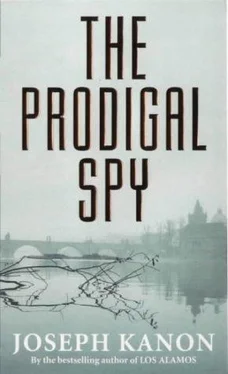“There’s more than one report?”
“The files are cross-indexed. It may be confusing to someone from outside.”
“So’s double bookkeeping.”
He glanced up, annoyed. “We’re an investigative agency. That means sensitive material. Sources, for instance. It’s more prudent not to keep everything in one place.”
“Where somebody might see it.”
“ We don’t own the files. A request comes down from the AG’s office-” He shifted, careful again. “It’s not always appropriate. You don’t want the files used for, say, political reasons.”
“No, of course not.” Almost a laugh.
Lapierre hesitated. “You say he’s dead?”
Nick nodded.
“All right, you ask, I’ll tell you. The official file wasn’t the same as the internal one. Couldn’t be. We were investigating Communists, not murder. There are some who would have preferred that, you know, for political reasons. To take people’s minds off the real issue. But we didn’t want it to be a murder case.”
“Then it might have been sent back to the police. Right out of your hands.”
Lapierre looked at him sharply, then nodded. “With predictable results. You keep forgetting, he wasn’t there. There would have been no case. They’d be spinning wheels.” He paused. “Besides, we didn’t want to get him that way. Not for murder.”
“Welles would lose his Red.”
“You don’t think much of the Bureau, do you? Think we’re just like the feet. Fact is, I didn’t run it as a murder case because I never thought it was. I always thought she killed herself.” He looked up. “While he was playing Scrabble.”
“Then how did the lighter get there?”
Lapierre looked at him with mild scorn, as if he had missed the obvious. “She put it there. There weren’t any prints, you know,” he said, watching Nick. “A little clumsy anyway, don’t you think? Leaving it like that. It was her. She wiped it on her skirt, or something-and out. She was going to take him with her one way or the other. What you said before, about going after her? It was always my understanding that she went to Welles. Her idea. Of course, I don’t know where your information comes from.” Lapierre’s eyebrows went up.
“Welles got everything from the Bureau.”
“Well, maybe you know that. I don’t.”
Nick stood for a minute looking at the ground, thinking. “But you kept it. Even though-”
“You can’t destroy evidence. That’s illegal.”
“So is hiding it.”
“It’s not hidden,” Lapierre said blandly. “I don’t know where you get this idea. To my knowledge, no one’s ever asked for it.”
“You kept it just in case you needed it,” Nick said to himself. “A little insurance.”
“Insurance?”
“If the statute of limitations ran out.”
“Don’t let your imagination run away with you. We didn’t expect it to run out. We expected to catch him.”
Nick looked up. “And tell him you had it, in case he wasn’t feeling cooperative with the committee. Loosen his tongue.”
“I don’t know about that. I was just supposed to catch him. But I didn’t.” He shrugged. “So the statute did run out.”
“But there’s no statute on murder.”
Lapierre looked at him, eyes cold again. “That’s right. Not on murder.”
“You would have hanged him with it.”
“That would have been up to the jury.”
“With your help.”
“I would not have withheld evidence, no, if that’s what you mean. The Bureau would never allow that.”
Nick felt a band of heavy air tightening around his chest, a land of noose.
“What the jury made of it-” Lapierre wiped his hands again, free of dirt.
“One way or the other,” Nick said, again to himself. “He could never come back.” Silver’s insurance.
“Come back? Why the hell would he come back? He got away with it.”
The woman came to the back door again. “Dad.” Insistent this time.
“All right,” he said, turning back to Nick. “I don’t know what you’re trying to prove. Everybody wants to get something on the Bureau these days. The Bureau didn’t do anything to your father. We never got the chance. We were the ones looking like jerks, not him. He got away with it.”
“Yes. He got away with it,” Nick said, seeing his father’s thin white legs as he put him to bed.
Lapierre began walking away.
“Tell me one more thing,” Nick said, stopping him. “You must have seen the Cochrane file.” A beat. “The internal one.”
Lapierre waited, interested.
“Was there a description of it, how she approached Welles?”
Lapierre thought for a moment. “No,” he said, “just the first interview.”
“Then how do you know she did?”
Lapierre began backing away. “Well, I guess I don’t know that either.” He gave Nick a thin smile. “Maybe you should ask Welles. He was there, not me.”
Molly, who’d been silent during the meeting, opened up in the car. “That was a mistake,” she said. “He’s going to report it. He thinks he’s still working for them. Did you see his eyes? Just like Jeff. I know something you don’t know. Even when they don’t. I’ll bet they’re all like that-they don’t know how to stop.”
“Well, so what? What if he does?”
“They’ll start watching again. How are we going to watch our friends if somebody’s watching us? God, it’s getting like Prague. Everybody watching everybody.”
“Maybe they’ll do the Navy guy for us,” Nick said lightly. “You don’t like the neighborhood anyway.”
“I’m serious. If they start tailing us, it’s like handing them the list. You know that.”
Nick nodded. “They have to find us first. Anyway, they’re not watching now. You want to take Mother Brown?”
Ruth Silberstein went to the movies. While Molly was parked in Chevy Chase, waiting for Brown, Nick trailed the Volkswagen to a suburban shopping mall. Her friend, a woman waiting at the box office, handed her a ticket and began a conversation that would last off and on through the show and into dinner afterward. They both chose the chef’s salad. Ruth drank several cups of coffee, her friend shared an envelope of snapshots-relatives or an office party, Nick guessed, when he passed by the table to look-and Ruth picked up a pint of ice cream on her way home. Then he saw the blue glow of the television set upstairs, the bathroom light as she got ready for bed, a small reading lamp for twenty minutes, and darkness. Nothing. It occurred to Nick as he sat smoking in the car that the only exciting thing about being a spy was the end, the final adrenalin jolt of exposure.
John Brown hadn’t returned.
“Just an evening with Mom,” Molly said, weary.
“One of them’s the connection,” Nick said. “It’ll happen.”
“I hope so. Who’s on tomorrow?”
“Try Irina again. I’ll do the Navy. Then I think I’ll take the Bureau’s advice and go see Welles.”
“Why?” Molly said, looking up.
“I want to know how it started, why she talked to him. It’s important.”
“Is it?” Molly said quietly, watching him.
“Silver didn’t start this. He just did what he had to do. Once it did. I want to know who started it all.”
“Who did it to you, you mean.” Her voice still quiet.
“Not just to me,” he said quickly, disconcerted. To all of us.
Molly started to say something, then backed off. Instead she went over to the mirror and started brushing out her hair.
“What makes you think Welles will talk to you?” she said. “You’re the last person he’d want to see.”
“I’ll use Larry’s name,” Nick said, thinking of Lutece. “It’s a real door-opener.”
Читать дальше












